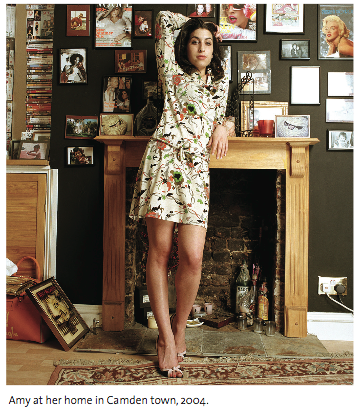
by admin
Amy Winehouse, “Typical North London Jewish Girl”
 Amy Winehouse died of alcohol poisoning at age 27 in 2011. A new documentary film, “Amy,” now in wide commercial release, has us reflecting on the life of this complicated and preternaturally gifted jazz singer.
Amy Winehouse died of alcohol poisoning at age 27 in 2011. A new documentary film, “Amy,” now in wide commercial release, has us reflecting on the life of this complicated and preternaturally gifted jazz singer.
When Winehouse belted out her raw, original songs — a combination of jazz and R&B — in her throaty contralto, she mesmerized listeners. Besides having a visceral musical talent, she had an unmistakably Semitic beauty accentuated by an outrageous fashion sense. We couldn’t stop listening to her, or looking at her, even as her illnesses were destroying her; in addition to addiction to alcohol and drugs, she suffered from bulimia and depression. In fact, the sicker she became, the more the public gawked. The documentary uses hundreds of film clips and the voice of the singer herself, along with the people who loved her, to tell her tragic story.
From the film’s beginning, viewers already know, and dread, her story’s ending. But as we watch it, we experience a revelation: although the media left us with the image of Winehouse as a depraved junkie, she was most of all just a young girl. Fame came to her too fast, and it devoured her. As the film demonstrates, other factors made her particularly vulnerable. She adored the men in her life — first her father, Mitch Winehouse, and then her husband, Blake Fielder. But both betrayed her.
In “Amy,” directed by Asif Kapadia, we meet the singer as a pleasantly zaftig and giggly teenager whose life was music. At age 16, she already had a manager. By the time she was 21, she was famous. But, as the movie makes clear, she never wanted that fame. “Once the public sees me they’ll realize I’m not good for anything but making music,” she tells a television interviewer in 2005 with a disarming ingenuousness. Watching this clip four years after her death, the viewer hears in her remark an unbearable poignancy.
When Amy was nine, we learn, her parents split up. Her father, a cab driver and amateur singer, had been seeing another woman from the time his daughter was a baby. Amy was devastated by the divorce. She acted out by cutting school with her boyfriend and smoking weed. Her mother, Janis, tells an interviewer that she was too much to handle. Amy needed her father back, and — ironically — he was often photographed at his daughter’s side after she became famous. But the film does not make clear whether he was available to his daughter when she was a child. At 21, Amy Winehouse met and she fell madly in love with Blake Fielder, who soon introduced her to hard drugs. Then he, like her father, abandoned her. She found expression for her pain by writing songs such as “Love Is a Losing Game” and “Back to Black.”
“A typical North London Jewish girl with attitude,” is how Nat Gatfield, who signed her on to Island Records, describes her in the film. Winehouse was clearly proud of her Jewishness: She accessorized her outrageous outfits with a large gold Star of David around her neck.